FSM Distinguished Service Award
The Food Safety Magazine Distinguished Service Award, established in 2003, honors individuals who best exemplify the characteristics of the dedicated food safety professional. Those honored are recognized by members of the profession for their collective works in promoting or advancing science-based solutions for food safety issues. The award statuette presented to the winners is a modern art rendering of a human figure reaching skyward in triumph, representing the significant impact that one person can have on the successes of many.
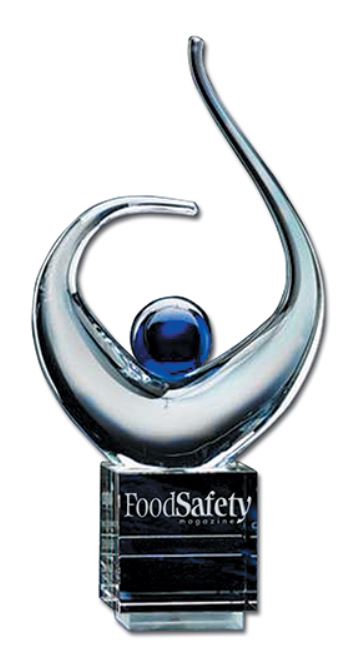

Joseph Corby
Joseph (Joe) Corby is recognized for his outstanding leadership, mentorship, and lasting contributions to food safety at both the state and national level throughout his more than 50-year career.
Corby began his public service in 1970 with the New York State Department of Agriculture and Markets, where he advanced from Food Inspector to Director of the Division of Food Safety and Inspection, a position he held until his retirement in 2008. He went on to serve for a decade as Executive Director of the Association of Food and Drug Officials (AFDO) and continues to support AFDO as a Senior Advisor.
Over the years, Corby has been instrumental in advancing national food safety policies and initiatives. He played a key role in the development of a state-imported food surveillance program in collaboration with FDA following the Bio-Terrorism Act of 2002, a model that would go on to become the foundation for today’s mutual reliance framework. He has authored numerous guidance documents and training materials focused on retail meat, poultry, and HACCP.
Corby has also served as an instructor and advisor for a wide range of agencies and institutions, including FDA, IFPTI, NEHA, and several universities.
In addition to the Distinguished Service Award, Corby is a recipient of the AFDO Harvey W. Wiley Award and the NSF Food Safety Leadership Award. His tireless advocacy for an integrated, collaborative food safety system continues to influence policy and inspire professionals across the field.

Kathleen (Kathy) Glass, Ph.D.
The work of Kathleen (Kathy) Glass, Ph.D. at the Food Research Institute (FRI) at the University of Wisconsin–Madison has enabled her to influence and promote food safety in academia, in industry, among the public, and to the government. Dr. Glass joined the FRI as a food safety researcher in 1985 and currently serves as Associate Director, assisting the food industry in assessing and developing formulation-safe foods. In addition, she trains and oversees undergraduate and graduate student independent study research, and is a regular instructor at workshops on food microbiology, preventive controls, Listeria control methods, processed meat and processed cheese safety, and dairy HACCP. Her research interests include the safety of low-acid refrigerated foods, ready-to-eat meats, processed cheese, and other dairy foods, focusing on the control of various bacterial pathogens. Dr. Glass earned her Ph.D. in Food Microbiology and Safety at the University of Wisconsin–Madison. She is a Past President of the International Association for Food Protection (IAFP) and its Wisconsin affiliate.

Michael R. Taylor, J.D.
Michael R. Taylor, J.D. has held leadership roles in public health and food safety in government, academia, and the private sector, with a major focus on modernizing the U.S. food safety system to prevent foodborne illness. He led the U.S. Food and Drug Administration's (FDA's) role in the legislative enactment of the Food Safety Modernization Act (FSMA) of 2011, and currently co-chairs the board of Stop Foodborne Illness, supporting and representing the victims of foodborne illness and their families. Prior to joining FDA in 2009, he spent nearly a decade in academia conducting food safety, food security, and public health policy research, most recently at George Washington University's School of Public Health. Mr. Taylor is a graduate of Davidson College and the University of Virginia School of Law.

Joe Stout, R.S.
Mr. Stout is a leader in quality and sanitation with over 40 years of experience in the industry. He founded Commercial Food Sanitation (CFS) in 2010, which provides strategic consulting, training, and solutions to address food safety, hygienic design, and sanitation challenges for food processing plants worldwide. Previously, Mr. Stout spent 30 years at Kraft Foods. While there, he held a variety of positions related to operations, quality, and sanitation, ultimately leading to his role as Kraft's Director of Global Product Protection, Sanitation, and Hygienic Design. Additionally, Mr. Stout led the American Meat Institute’s (AMI’s) Equipment Design Task Force and has partnered for Listeria intervention training with AMI and the American Frozen Food Institute Hygienic Design initiatives. He is currently leading continuous improvement in equipment hygienic design, both in process plants and field harvest equipment. Mr. Stout facilitated the development and execution of the Dairy Food Safety Training classes with Dairy Management Inc.'s Innovation Center. He is also a published authority on the subjects of food safety, sanitation, hygiene, and related areas, and is the recipient of the IAFP 2015 Sanitarian of the Year Award and the IAFP 2020 Food Safety Award. He became a Registered Sanitarian in the state of Pennsylvania in 1985.

Frank Busta, Ph.D.
Dr. Busta is the director emeritus of the National Center for Food Protection and Defense (NCFPD; now Food Protection & Defense Institute) and professor emeritus of food microbiology at the University of Minnesota. He was named as the first director of NCFPD in 2004. Previously, he held faculty positions at the University of Minnesota, North Carolina State University, and the University of Florida. He served as chair of the Department of Food Science and Human Nutrition from 1984 to 1987 at the University of Florida and head of the Department of Food Science & Nutrition, University of Minnesota, from 1987 to 1997. Dr. Busta’s research areas are in food safety, growth, and survival of microorganisms after environmental stress in food, microbial ecology, and food defense. He has published more than 125 refereed research papers. He has served as Chief Technology Advisor on a UNDP project in China on agri-processing within the WTO framework. He retired in 2002 from the International Commission on the Microbiological Specifications for Food after 15 years of service. He received his B.A. and M.Sc. from the University of Minnesota and his Ph.D. from the University of Illinois.

Theodora Morille-Hinds, M.Sc.
Theo Morille-Hinds joined The Kellogg Company as a senior director of global food safety and sanitation in July 2011 and was promoted to vice president of global quality food safety in November 2013. In this role, she provides leadership for multiple global functions including food safety, quality compliance to design, quality innovation, supplier for ingredients, packaging and premiums, auditing and quality management systems. Prior to joining Kellogg, Theo was employed by Kraft in Tarrytown, NY. Theo is on the Food Safety Advisory Board of the University of Georgia and Tuskegee University. She is also President of the Board of Safe and Secure Approaches to Field Environments, and affiliated with a number of industry associations. She advocated and secured funding for the Center for Research on Ingredient Safety, which was formed to ensure credible, relevant information on ingredient safety is accessible to a wide range of decision-makers, at Michigan State University.

Darin Detwiler, Ph.D.
Detwiler, currently the assistant dean at Northeastern University’s College of Professional Studies, will be presented with the award during the IAFP awards reception and banquets on Wednesday, July 11, 2018.
Detwiler’s work at the university includes quality assurance supervision for all undergraduate and graduate programs. He is also a professor of food regulatory policy, responsible for the development and instruction of courses related to food safety, global economics of food and agriculture, and food policy for graduate students who work in the food industry. He additionally advises industry and government agencies, addressing food safety and authenticity issues in the U.S. and abroad. After the loss of a son to E. coli in a landmark outbreak 25 years ago, he consulted with the U.S. Department of Agriculture (USDA) in strengthening food safety policies, particularly in the areas of consumer education, product labeling, and their pathogen reduction program. In addition to serving in various educational and advisory capacities, his committee work includes appointments to two terms as a member of the National Advisory Committee on Meat and Poultry Inspection for USDA, where his work improved standards and policies related to risk-based sampling. As the senior policy coordinator for a national food safety organization, he evaluated pertinent regulatory issues for the USDA and the U.S. Food and Drug Administration (FDA) as a consumer advocate in their stakeholder advisory group. He later served two terms as a council member for the Conference for Food Protection, identifying and addressing emerging problems of food safety to influence model laws and regulations among all government agencies. Detwiler received his doctorate of law and policy from Northeastern University with a research focus on state implementation of the FDA Food Safety Modernization Act.

Dane Bernard, M.Sc.
Bernard, currently the managing director of Bold Bear Food Safety, and Bennett, senior policy analyst at the U.S. Food and Drug Administration (FDA) Center for Food Safety and Applied Nutrition, will be presented with the award during the IAFP awards reception and banquet on Wednesday, July 12, 2017.
Bernard served as vice president of food safety and quality assurance at Keystone Foods until 2014. He was responsible for global programs on Hazard Analysis and Critical Control Points (HACCP) and food safety. Prior to joining Keystone, he was vice president of food safety for the National Food Processors Association, where he had worked since 1973. A registered specialist in food, dairy and sanitation microbiology with the American Academy of Microbiology, Bernard has done extensive testing of food processing systems, supervised research in many areas of food safety and has authored/coauthored several technical articles. He has been an instructor and lecturer on principles and applications of HACCP and has helped formulate HACCP plans for the U.S. food industry. Bernard has been invited as an expert to five International Consultations sponsored by the Food and Agriculture Organization and the World Health Organization that dealt with certain aspects of HACCP, risk analysis and other food safety issues. He received an M.Sc. in food microbiology from University of Maryland, College Park.

Reginald W. Bennett, M.Sc.
Bennett began his career in microbiological research and policy in 1956 as a medical bacteriologist at Presbyterian Hospital in Pittsburgh, PA. He joined FDA in 1960 as a microbiologist in the Microbiology Division. From this point, he rose through the ranks to acting chief, Food and Cosmetic Microbiology Branch, to chief, Microbial Methods, Development Branch, and to his present position in the Office of Regulatory Science. Chief among his scientific contributions are his methods development for the serological identification of heat-altered staphylococcal enterotoxin in canned foods and for development of methods to detect heat-altered staphylococcal enterotoxin and their use in ensuring food safety of canned foods. Bennett has received numerous awards over the years. He is a fellow of the American Academy of Microbiology and AOAC International, a member of the American Society for Microbiology, Institute of Food Technologists and the International Association for Food Protection. Bennett received an M.Sc. in microbiology from the University of Pittsburgh.

John Larkin, Ph.D.
Larkin, currently is the research director at the University of Minnesota’s Food Protection and Defense Institute. His work at the institute includes project planning, resourcing, team building and deliverables. He is involved in the identification of strategic initiatives and research needs related to the mission of the institute and development of project goals and deadlines; he also assists industry and government agencies with addressing food protection and defense issues. Previously, he was associate director of research at the U.S. Food and Drug Administration (FDA), where he evaluated pertinent regulatory issues for technology used to preserve food, in particular, shelf-stable food and extended-shelf-life products. His activities at FDA involved new preservation technology, software validation criteria for computerized process control systems, low-acid canned-food processing systems, pasteurization processing for juice and nuts, and evaluating the lethal treatment of aseptically processed foods containing particulates. He also served as an assistant professor of food engineering at Virginia Tech and received his Ph.D. in food engineering from Michigan State University.

Connie Kirby
The 2015 Food Safety Magazine Distinguished Service Award was presented to Connie Kirby at the 2015 annual meeting of the International Association for Food Protection in Portland, OR. Connie received an M.Sc. in food science from Oregon State University in 1990. In her 25-year tenure with the Northwest Food Processors Association (NWFPA), she managed the growth of the nation’s largest regional trade association food safety and policy program, linking a grass-roots network of industry, regulatory agencies and academia in the Northwest and beyond to address common food safety goals. Within the association, Kirby provided executive leadership and managed the operations and technical affairs issues for the 150 member food processors and 350 supplier member companies. Prior to NWFPA, she served as the manager for corporate quality assurance at Foster Farms and as a quality control inspector/chemist and later as the manager of quality control for Armour Foods.

Ann Marie McNamara
Ann Marie McNamara is vice president, food safety and regulatory compliance, Jack in the Box and recieved the 2014 Food Safety Magazine Distinguished Service Award. She previously served as vice president of food safety and scientific affairs at Silliker, Inc., and as corporate vice president of food safety and technology for Sara Lee Corp. From 1992 to 1999, she served as director of microbiology for the Food Safety and Inspection Service of the U.S. Department of Agriculture (USDA). She received the Secretary of Agriculture’s Superior Service Award five times in her 7-year career at USDA. She was appointed by three Secretaries of Agriculture to serve 9 years on the National Advisory Committee on Microbiological Criteria for Foods.
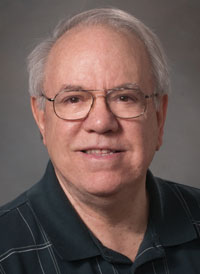
Steve Taylor, Ph.D.
At the 2013 annual meeting of the Institute of Food Technologists (IFT), Steve Taylor, Ph.D., was presented with the Food Safety Magazine Distinguished Service Award at the joint social of the Nonthermal Processing and Food Engineering divisions of IFT. Dr. Taylor is professor in the department of food science & technology and co-director of the Food Allergy Research and Resource Program (FARRP), a successful industry-funded consortium at the University of Nebraska. He maintains active research on food allergies, including development and improvement of detection methods, assessment of effects of processing and threshold doses and risk assessment. He also maintains an active food industry outreach program in the area of food allergies, including confidential testing services and workshops, training and webinars.
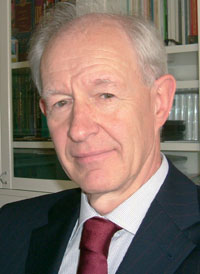
Huub Lelieveld
At the 2012 annual meeting of the Institute of Food Technologists (IFT) in Las Vegas, NV, Huub Lelieveld was presented with the Food Safety Magazine Distinguished Service Award at the joint social of the Nonthermal Processing and Food Engineering divisions of IFT. Mr. Lelieveld’s outstanding commitment to food safety is reflected in his roles as president of the Global Harmonization Initiative, member of the Executive Committee and past-president of EFFoST (the European Federation of Food Science and Technology), and founder and past-president of EHEDG (the European Hygienic Engineering and Design Group). He continues to be active in various societies and helps drive innovation and advances in the processing of safe food. As a longtime member of the Editorial Advisory Board, and frequent contributor to Food Safety Magazine, we are pleased to honor Huub’s stellar contributions on global food safety, hygienic processing and plant design, and novel food processing technologies, which are unparalleled in the food industry.
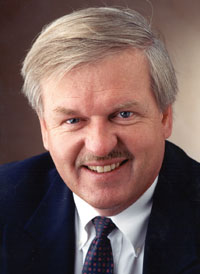
David Theno, Ph.D.
Dr. David M. Theno, Senior Vice President, Quality and Logistics at Jack in the Box, Inc., is recognized for his outstanding service and contributions in advancing food safety by developing Jack in the Box’s food safety programs and leading efforts industry-wide to improve food safety measures in industry and reduce the incidence of foodborne illness in the U.S. Under his direction, Jack in the Box’s food safety systems have become the gold standard against which other foodservice establishments benchmark the quality of their food protection management programs.
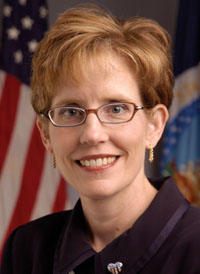
Dr. Barbara J. Masters
Dr. Barbara J. Masters, Senior Policy Advisor at Olsson, Frank and Weeda, P.C., is recognized for her outstanding service and contributions in advancing food safety with the U.S. Department of Agriculture’s Food Safety Inspection Service for more than 17 years, most recently as FSIS Administrator. Masters’ efforts in the development and implementation of FSIS HACCP and SSOP rules, regulations and guidelines, as well as her leadership and commitment to building an effective science-based policy infrastructure at FSIS, have contributed to improved food safety measures in industry and the reduction of foodborne illness in the U.S.
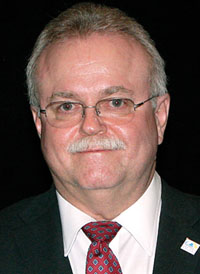
John N. Butts, Ph.D.
Dr. Butts, Vice President, Research, with Land O’Frost, Inc. was recognized for his pivotal work and leadership in the development of Land O’Frost’s Seek & Destroy program of sanitation, equipment and maintenance; his leadership in the implementation of one of the first food processing plant HACCP programs in the U.S.; and as part of the Land O’Frost Design Team, his leadership in the company’s application of the AMI Principles of Sanitary Equipment and Facilities Design guidelines in the construction and design of Land O’Frost’s new greenfield processing facility opening in 2006.
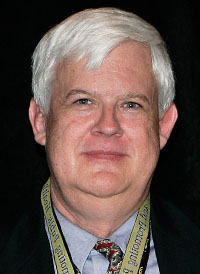
Don L. Zink, Ph.D.
Dr. Zink, Senior Food Scientist, Office of Plant and Dairy Foods and Beverages, Center for Food Safety and Applied Nutrition, U.S. Food and Drug Administration, was recognized for his nearly 30 years of contributions that have advanced sound food safety science in all three stakeholder groups—academia, industry and government. Among his accomplishments, he was instrumental in advancing the use of HACCP through active participation in numerous food industry, trade associations and government committees; developed and implemented harmonized food safety policies and procedures for Nestlé USA, and most recently, is leading efforts at FDA to advance food safety through current Good Manufacturing Practices (cGMP) modernization and allergen control guidelines.
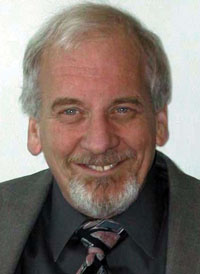
Robert L. Buchanan, Ph.D.
Dr. Arthur Miller of the U.S. Food and Drug Administration (FDA) accepted Dr. Buchanan’s statuette. Buchanan, Senior Science Advisor and Director of the FDA’s Office of Science was out of the country at the time of the award presentation. The FSM award acknowledges Dr. Buchanan’s pioneering work in the areas of predictive microbiology, quantitative microbial risk assessment and HACCP during the course of his 30-year career, including the development of the USDA Pathogen Modeling Program and overall science-based public health policy.
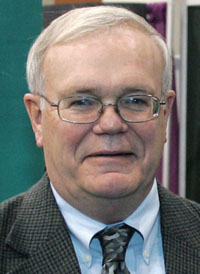
R. Bruce Tompkin, Ph.D.
2005 FSM Distinguished Service Award honoree Dr. R. Bruce Tompkin’s efforts have been directed toward improving the microbiological safety and quality of food during the course of 37 years as Chief Microbiologist and Vice President Product Safety for ConAgra Refrigerated Prepared Foods. The FSM award recognizes his industry leadership in defining the principles of HACCP, the concept of a food safety objective (FSO) and the role of microbiological testing in food safety management systems, greatly adding to the industry’s knowledge of the mechanisms of pathogens and prevention and control methods that enhance food product safety and prevent foodborne illness.
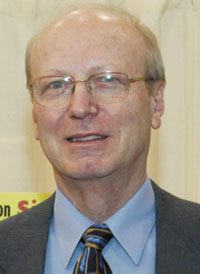
William H. Sperber, Ph.D.
Dr. Sperber, a renowned food microbiologist who has been appointed five times by the U.S. Secretary of Agriculture to the National Advisory Committee on Microbiological Criteria for Foods, was recognized for his pioneering work at the Pillsbury Co. in the development of the Hazard Analysis and Critical Control Points (HACCP) food safety program model. His 32 years of continuous experience with the HACCP system of food safety is quite likely the longest active streak on the planet. During his career, Dr. Sperber worked for three major food companies—Best Foods, Pillsbury and Cargill—and has become one of the world’s experts in controlling the microbiological safety and quality of foods. A former chair of the IFT Division of Food Microbiology and the Food Microbiology Research Conference, Dr. Sperber was appointed in 2000 to the FAO/WHO roster of experts for microbiological risk assessments. In 2001, the International Association for Food Protection presented Dr. Sperber with the Harold Barnum Industry Award, and in 2002, the American Meat Institute Foundation presented him with its inaugural Scientific Achievement Award. Now semi-retired, Dr. Sperber is a strategic advisor to Cargill’s food safety program and remains actively involved in professional activities on a personal level, including the development of a textbook on food safety and HACCP.
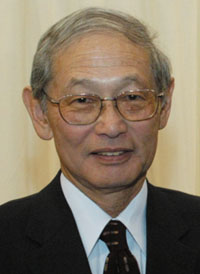
Keith Ito
The 2004 Food Safety Magazine Distinguished Service Award also was presented to food microbiologist Keith Ito, who retired in 2003 from the National Food Processors Association (NFPA) as a senior vice president after serving NFPA members and the food processing industry for more than 40 years. Mr. Ito was recognized for his instrumental work in identifying the thermal and chlorine resistance of Clostridium botulinum and the thermal and germicidal resistance of botulinum spores, and his leadership in advancing aseptic processing of low acid and acidified canned foods. Mr. Ito’s work in these areas saved millions of lives by virtually eliminating botulism risk in canned foods. Mr. Ito’s position at the National Canner’s Association provided him with the opportunity to help develop and implement the U.S. Food and Drug Administration’s Low Acid Canned Food Regulations, which have formed the basis of the production of low acid and acidified canned foods throughout the world. Since these were implemented, foodborne illness resulting from commercially canned foods has plummeted to almost zero. Although he retired from NFPA in 2003, Mr. Ito continues in his role as director of the University of California Laboratory for Research in Food Preservation, where he is now leading investigations into the efficacy of non-thermal processing systems.

Larry R. Beuchat, Ph.D.
Dr. Beuchat, Distinguished Research Professor with the Center for Food Safety and Department of Food Science and Technology at the University of Georgia, was recognized for his nearly 40 years of outstanding contributions to the advancement of food safety science in the area of the microbiology of fruits, vegetables, nuts, and legumes, and his overall leadership in promoting safe fruit and vegetable production practices. Currently, Dr. Beuchat is involved in researching the standardization of methods for determining the efficacy of raw fruit and vegetable sanitizers, reviewing the lethality of sanitizers to Bacillus cereus, and evaluating a wide array of processes and technologies to eliminate or control the growth of pathogens in foods.
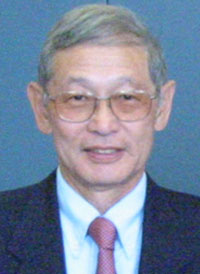
Allen Katsuyama
The Food Safety Magazine Distinguished Service Award was presented posthumously to Allen Katsuyama, a leading scientist and educator with the National Food Processors Association (NFPA) for almost 40 years, where his achievements remain widely respected and admired. Katsuyama is an acknowledged pioneer who helped clarify the relationship between HACCP, sanitation and GMPs in achieving food safety. This action set the stage for industry and government to separate sanitation and GMP programs from HACCP, thereby protecting and preserving the integrity of the HACCP system. A respected educator who was well-known for his expertise in the area of food processing sanitation, Katsuyama’s seminal work, “Principles of Food Processing Sanitation,” is regarded as an industry standard.
Never miss the latest news and trends driving the food safety industry
eNewsletter | Website | eMagazine
JOIN TODAY!Copyright ©2025. All Rights Reserved BNP Media.
Design, CMS, Hosting & Web Development :: ePublishing